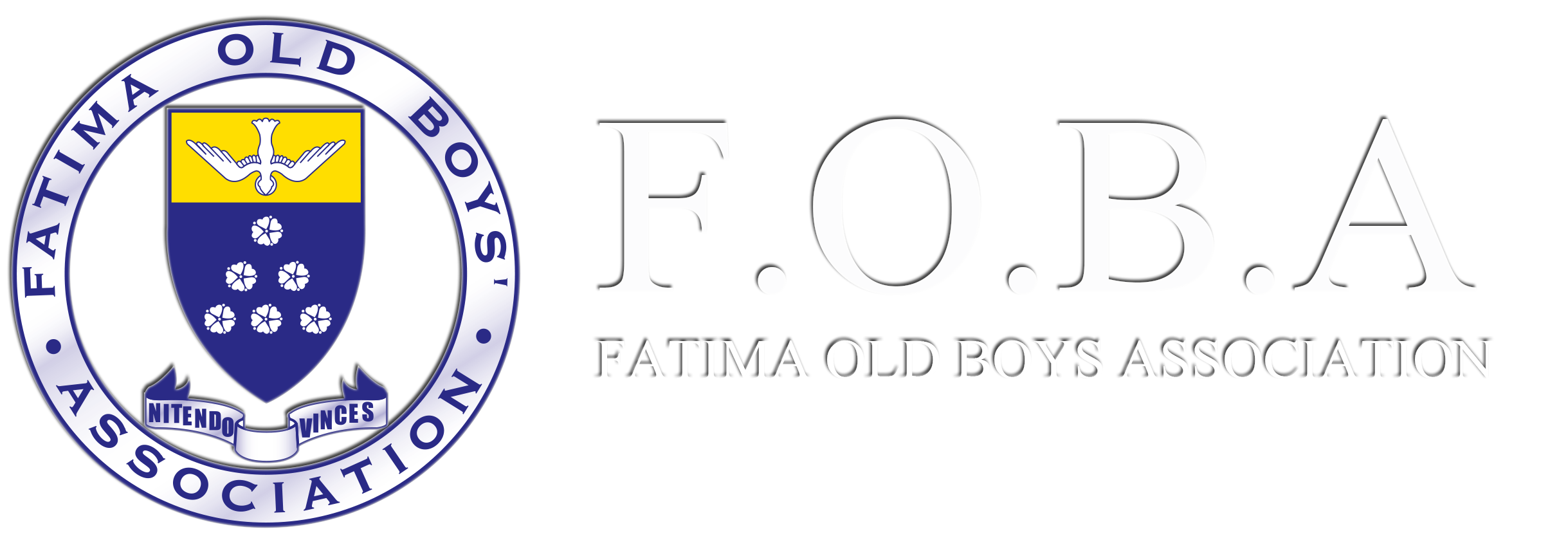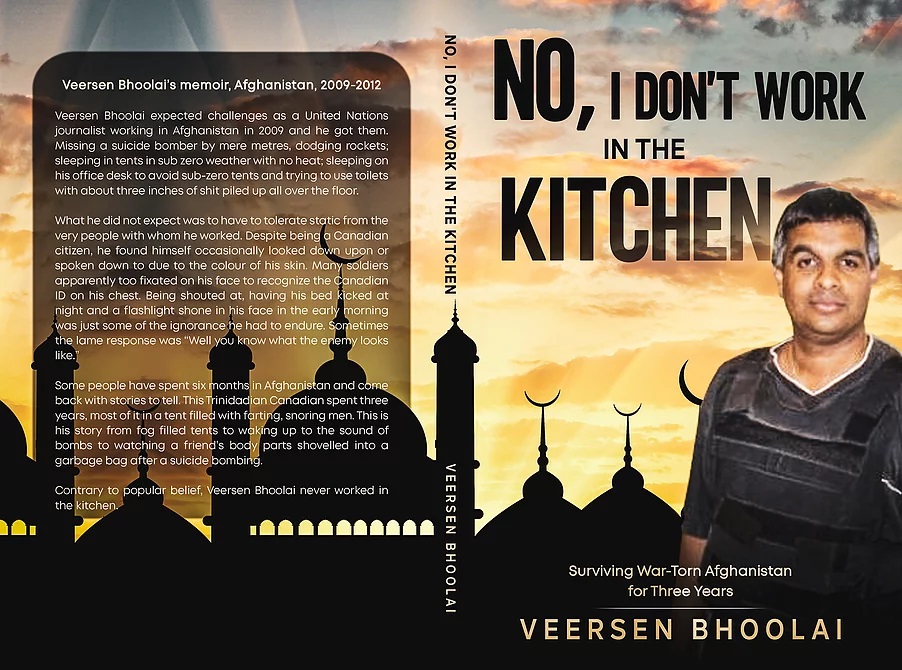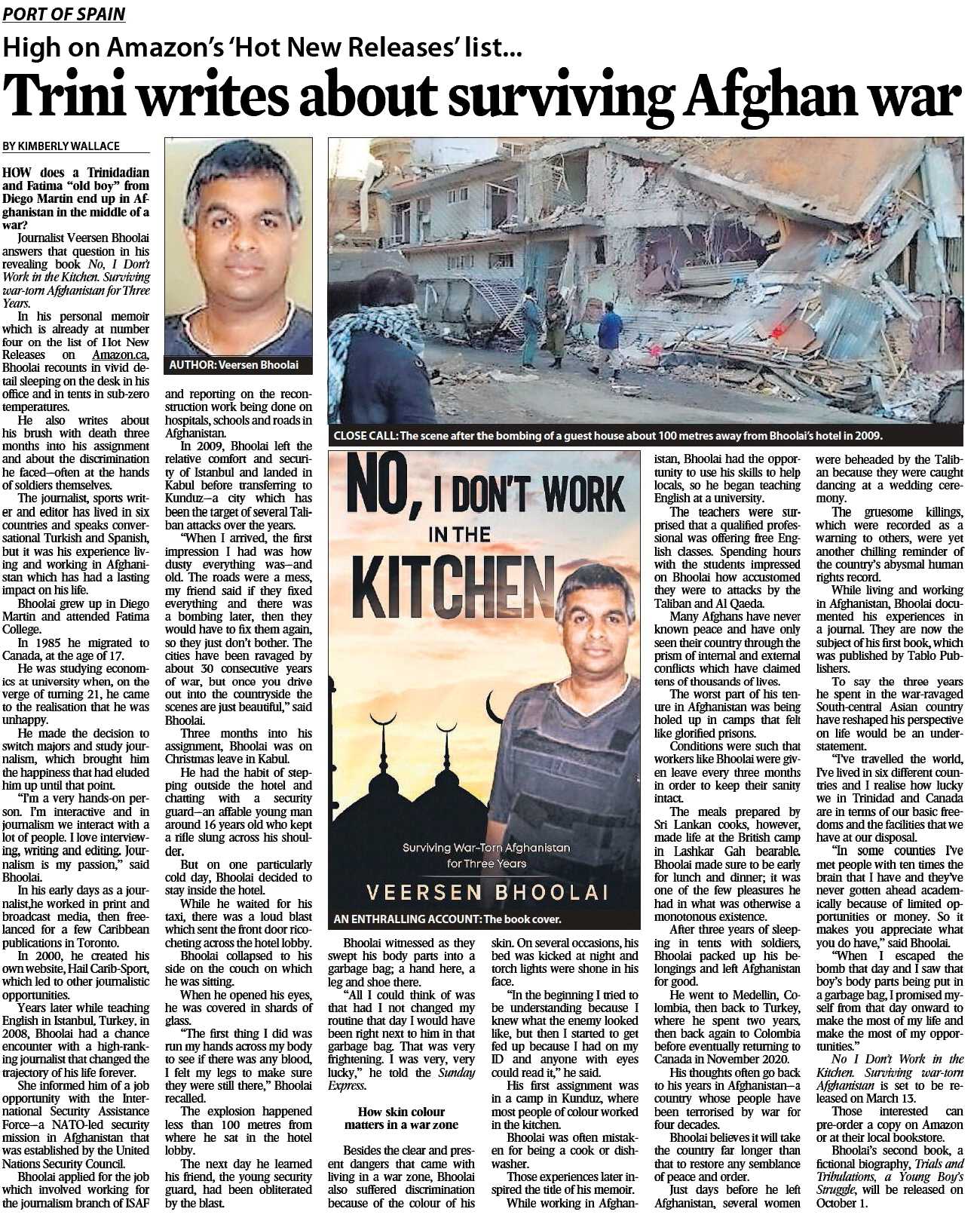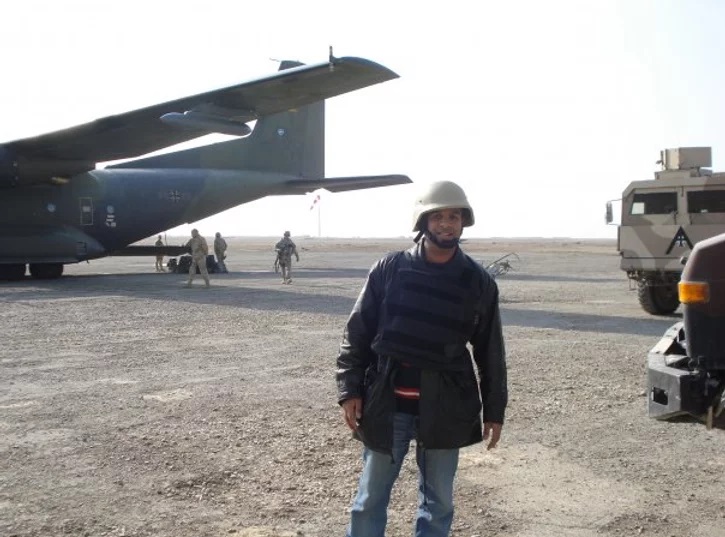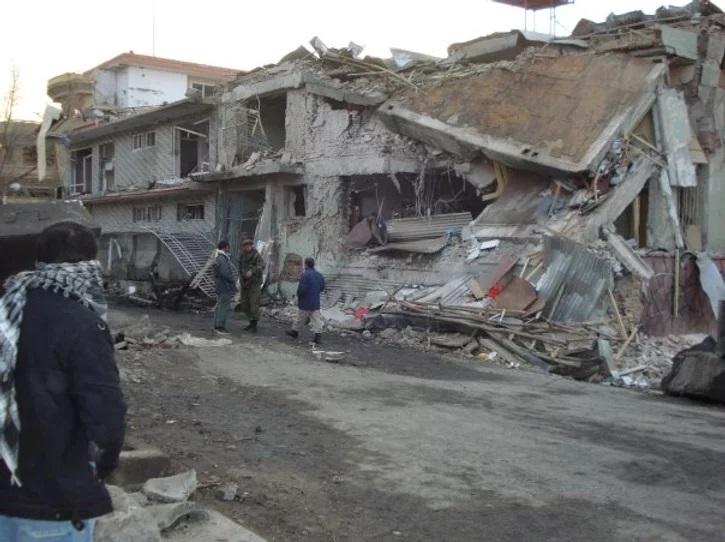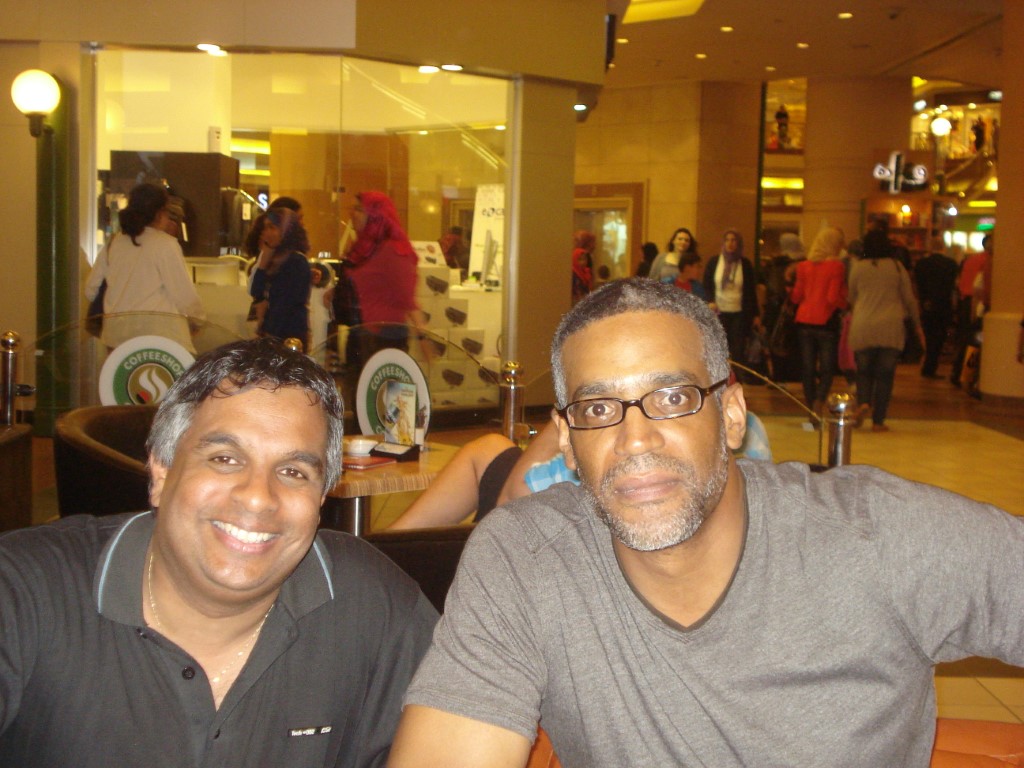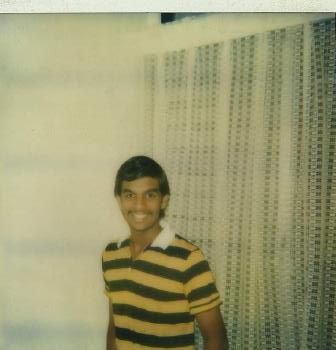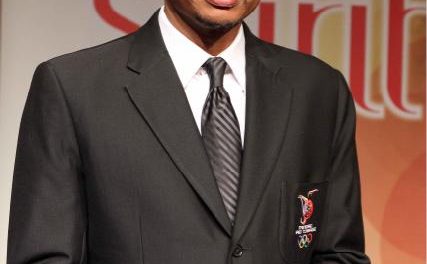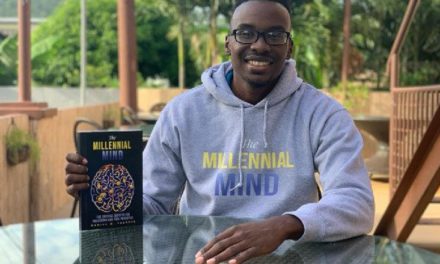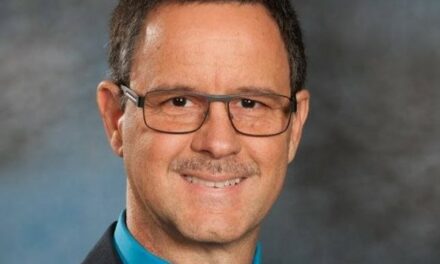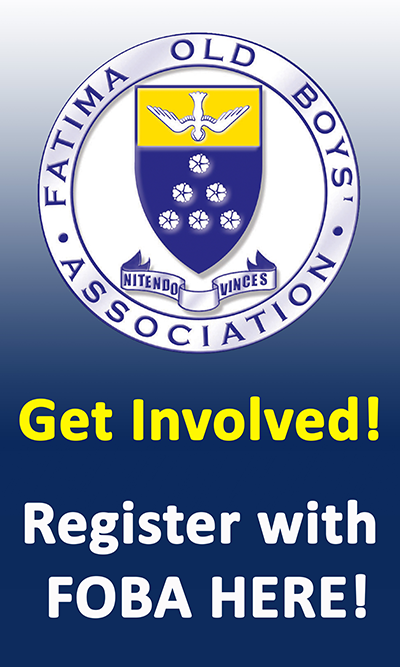- Views 0
- Likes 0
Veersen on his way from Kunduz to Kabul, Afghanistan – November 2009. His transportation is behind him
Missing a suicide bomber by about a hundred metres in Kabul, Afghanistan – December 2009.
Egypt 2012
Egypt 2012
Trevi Fountain – Rome 2012
Veersen with Raul Thomas, Class of 1985 – Cairo, Egypt 2012
1984
Emirates Stadium – London 2012
Mother Temple – Bali 2012
Veersen’s YouTube post from 15 August 2021 on his reaction to the Taliban takeover of Afghanistan
Veersen’s YouTube post from 24 August 2021 on the threat posed to his Afghan drive and reporter
Veersen Bhoolai (Class of 1985) has been a qualified Journalist for 30+ years and an English as a Second Language (ESL) teacher for 20+ years. He is also a sports writer and editor, has lived in six countries (Trinidad & Tobago, Colombia, Turkey, Afghanistan, Solomon Islands and Canada) and speaks conversational Turkish and Spanish. In March 2021, his first book was published, titled “No, I Don’t Work in the Kitchen: Surviving War-Torn Afghanistan for Three Years”. The book is a memoir of his time in Afghanistan, working as a Journalist for NATO with the International Security Assistance Force (ISAF). ISAF was a NATO-led security mission in Afghanistan established by the United Nations Security Council.
https://vbhoolai.wixsite.com/
https://vbhoolai.wixsite.com/
Q. Why did you select Fatima?
In Trinidad, when you wrote the Common Entrance Exams, naturally you wanted to go to a prestige school. I lived in Diego Martin and I wanted Fatima.
Q. Tell us about your memories at Fatima – pleasant and/or non-pleasant.
Well, let me say that I always appreciated being a Fatima Boy. Many wanted to go to that school but few were chosen. I loved the friendships, and of course playing sports at lunch time or after school with my classmates. I loved Intercol Football and was an avid fan. I became a teacher later in life and remembered some of my better teachers––and of course, appreciated the challenges of their job even more.
In terms of “non-pleasant”, I never cared for Spanish or French when I was at Fatima. I figured I was from TT and what would I need with those languages in the future? I really didn’t like to study and asking me to do it in a foreign language was even worse! It is one of the dumbest things you can ever do when you have such an opportunity. As an adult, I cannot tell you how many times those languages have come in handy for me, personally and professionally. Fortunately, I lived in Colombia for a few years and improved my Spanish. I remember visiting Paris in 2010 and trying to dredge up my Fatima French. I saw a great opportunity for me with an NGO in Belgium, but the lack of French let me down.
I must say I was a bit deviant at Fatima. I was always the class clown and a bit talkative. This got you sent to the Dean, which meant blows! Three incidents come to mind: (i) The first was with a French teacher, Ms. Gooding in Form II. She was just out of school (St. Augustine). She was a bit young and perhaps I did not always take her seriously when she spoke. I didn’t realize it but I would steupps a bit when I answered her. One day she got fed up and took me to the Dean Mr. Sendurji. She left me outside while she spoke to him. I thought I was being sent for speaking in class. However, she was complaining about the steuppsing. She then sent me in and left.
Durj asked me what I had to say for myself. I, thinking I was there for just speaking out aloud, tried some reverse psychology, “I have no excuse, Sir. I was wrong.” He looked at me in surprise, “Oh, you admit it? You were wrong?”
“Yes, Sir.”
He gave me a proper benching of six and told me to come back for the rest of the week at lunchtime for more. Thank God it was a Tuesday. Wednesday and Thursday weren’t so bad. For Friday, I wore extra underwear. I don’t know why but just before he started, he asked me, “I hope you are not wearing a bunch of underwear?“
“Oh no, Sir. You want to check?”
He just laughed and benched me. That one really hurt because he hit me behind my legs and it left some red bruises. Pretty sure that was illegal, but I kept it to myself. 😉 Later, when Ms. Gooding said why she had sent me to the Dean, I just shook my head. Believe me, having had to go through the week knowing you had reserve benchings for the rest of the week wasn’t easy.
(ii) I came to school a few minutes late one day in Form V. Mr. Moore the Principal, saw me and noticed my top button was undone. I actually had no top button. He sent me to his office and I was made to wait for him. He then showed up, gave me a safety pin and then “six of the best. “ 😉
(iii) Ms. Heywood taught Eng. Lit. at Fatima. Late in the Form V year, I had a habit of throwing garbage in the bins as if I were a basketballer. One day as she took the attendance after lunch, I posed up with some rubbish and took my three points. She told me to go stand by the door. She then started to shout “Pick it up. Pick it up.” I had no idea what the hell she was talking about. I then realized that she wanted me to pick up the rubbish from inside the bin. I first explained to her that it was illogical. But she kept insisting. So I just turned away and refused. She took me into the corridor not too far from the Vice Principal’s office and started screaming. Not surprisingly, the VP came out. Who he happened to be at that time? Mr. Sendurji! I was made to pick it up, and taken to Mr. Moore’s office. After consulting with both Ms. Heywood and myself, he gave me a speech about my future and wanting a Letter of Recommendation from Fatima College, and to be careful. No blows that time. 😉
Q. Did any teacher(s) at Fatima stand out the most for you?
I would say Ms. Zakour (Spanish), Mr. Niles (Geography) and Mr. Des Vignes (English/History). Ms. Zakour, because she was as sweet as she was pretty, a very down-to-earth, humble person. Mr. Niles, because he was good at his job and he liked to give lyrics to the students. Mr. Des Vignes, because he taught my two favourite subjects: English and History. I loved his class and he appreciated my effort.
Q. Did you play any sports or take part in any extracurricular activities at Fatima?
I was never good enough to represent the school in any sport but I played a lot of cricket, football and table-tennis. I played in the odd inter-class match. I remember once I was in a Form III vs a Form II match with Brian Lara on the side! It was Small-Goal in the inner yard after school. Brian was a bit precocious and wanted to gallery. He collected a ball, pushed it past me and had the audacity to wait for me so he could beat me again. I anticipated the move and kicked the ball away. He was so small, he collapsed and the referee called a foul. I slid tackled a few men that day on a wet turf, but the tackle on Brian was clean. 😉
Q. Have you been able to maintain friendships with your classmates since school?
Definitely. The advent of the internet and Facebook has made it easier to do so. Many of us are in different countries, but we meet up when and if we can. I visited Cairo, Egypt, in 2012 and Raul Thomas (Class of ’85) was working there. We had a great time over dinner and then lunch the next day. It was kind of surreal. I hadn’t seen him since we left Fatima––then 27 years later in Cairo of all places!
Q. You were studying economics at University in Canada and then decided to switch to Journalism. Why the change?
I was accepted to York University in January of 1987. I had no idea what I really wanted to do. However, my parents said, ‘Just get your first Degree and you can find another Major later on’. I was also advised that I could change my Major later on if I wanted. I loved English and History but other than teaching, I didn’t know what I could do with that. I was under the impression that I would return home one day but I didn’t see me as a teacher. I chose Economics because I had done well in it at my Canadian high school. However, doing about four Econ subjects a year was really boring and I had no motivation.
A year later, on the verge of my 21st birthday, I was a bit panicked. I didn’t know what I wanted to do. I had always liked sports and had told my friends that I could read the sports new on TTT. I decided to go for what I loved. I didn’t know if I would be rich, but I knew I would be happy. I loved what I was doing and performed well in class. (If you do what you love, it isn’t really work.)
Q. In 2000, you created your own website, Hail Carib-Sport. Tell us about that.
I had worked for a few Caribbean publications in Toronto during the nineties. I was persuaded to create a Caribbean publication of my own around 1995 with the idea that certain people would contribute with their skills or financial resources. Unfortunately, many people did not follow through. So I closed the paper down in 1997 as I preferred to not do it at all than to do it badly. The paper was called Hail. I then started a website in 2000 called Carib Sport, focusing on sports for the Caribbean fans. I had technical issues in 2008 and being abroad and unable to solve those, the site sort of disappeared. I brought it back in 2018 and merged the two names, thus, Hail Carib-Sport. Again, this is for the West Indian sports fan.
It has a strong Trini flavour; I do this for free and in my free time. There is a great article there on Ronnie Simmons and the Fatima football team of 1981, as well as Graeme Rodriguez and the Intercol team of 1979.
Q. Favorite sport(s)/team(s)?
Boxing, football, cricket, athletics. I am an Arsenal fan. I was confused as to how sometimes in my travels in Europe in non-English speaking countries, tourists would just assume I spoke English and come up to me to ask a question, e.g. for directions. It took me ages to realize I was wearing my Arsenal jacket and they recognized it!
Q. You taught ESL in Colombia and Turkey. How did you get into teaching ESL, especially in those countries? Any unique experiences or challenges to share?
I had always wanted to travel when I was younger. As a kid I really didn’t see that much out of TT. That slowly began to change when I was 12. However, I wanted to see THE WORLD. I decided to get a TESL Certificate in the nineties and use it as a passport to teach abroad. I didn’t expect to be so good at it, but I really liked it. (I realized I am a hands-on person and like to interact with people as it is more interesting than an office job.)
I was offered jobs in Colombia and Turkey and accepted as they were the best offers at the time. I lived in Colombia for six months in 2000, and then for six years between 2012-2020. I lived in Turkey from 2001-2009, and then again from 2013-2015.
I love history, and I can tell you visiting the archaeological sites in Turkey just blew my mind: the city of Ephesus, Mary’s house, the archaeological museums. Even just driving in and out of Istanbul and going under the Roman aqueducts which have to be around 1,800 years old! Discoveries in Turkey are constantly rewriting the history books, e.g. Gobekli Tepli, a structure that is around 12,000 years old which predates other structures by about 2,000 years––even Writing! The world’s oldest Gladiator Graveyard was also discovered in Izmir.
What I loved most about Colombia was that most people were down-to-earth and polite–– except for the local Transmilenio, a sort of Express Bus where they can be quite pushy. Medellin is a beautiful city and always seems to be airconditioned outside!
I have to add: it’s always a thrill to meet your fellow-Trinis in these far-flung places. I met a teacher Natalie from Arima in Istanbul. She and I watched TT vs Sweden at the 2006 World Cup in a local bar. No one was really watching the match except she and our friends with us. The Turks kept turning to see why we were shouting so much. I think the bartenders were amused at my stress. But they do the same for their country, so they understood. It’s almost as if football is an international language. We may have different cultures but we understand the love of football.
Q. Of all the countries you have lived in, which had a culture most similar to Trinidad’s?
I would have to say the Solomon Islands. I was on the main island, Guadalcanal. I went outside of typhoon season. Their weather is basically tropical, so the vegetation is similar. Also, they speak a type of Pidgin English which has similarities to our local dialect in Trinidad.
Also, I should add that in Colombia, depending on the city and altitude, the environment can really differ. Cartagena and Cali both had a tropical feel to it. I can’t say the Colombians were similar to TT but in the tropical areas you would see things that reminded you of
TT––such as husking a coconut and drinking it from the coconut man, or using the cocoyea broom! They were shocked that a Trini knew the word “cocoyea”, or that like them, we use it as a broom or in the making of kites!
Q. How did you get the job with the ISAF, and what was your core function in Afghanistan?
A Turkish friend of mine worked for ISAF. She told me of a vacancy and that I certainly had the credentials for the job, so I applied. My job was to take the work of the local Reporters in my province, edit it and pass it on. I also wrote my own stories.
Q. What were your three main take-aways from your time in Afghanistan?
The first is how lucky we are in places like TT and Canada. Afghanistan was once a beautiful country where people lived a very western life. Today they are a war-torn country, with many of their people having suffered incredible atrocities. I saw videos of the Taliban beheading some of their prisoners. It was truly savage! No human should ever do that to another.
Afghanistan is rich in minerals, to the tune of three trillion dollars or more. The foreigners have spent billions of dollars investing in their infrastructure, and lost thousands of lives. You can bet that certain countries want to cash in on some of those natural resources. Therefore, expect many countries to have a presence there even if it’s non-military.
Many cities are worn and drab-looking, because of constant war. However, I managed to go out in the countryside and it is truly untouched and beautiful. The Afghans are just like you and me––they want to live a normal life and see their children grow up. However, they have to find a way to adapt and move on in life.
Q. Why title your book “No, I Don’t Work in the Kitchen…” ?
When I arrived at my first post in Kunduz in the northern part of Afghanistan, it was a German camp. The soldiers kept asking me if I worked in the kitchen. I was a bit surprised by this. The only other people of colour were some Africans working in the kitchen. Even in other camps, I was spoken down to sometimes because they assumed I was Afghan and probably some low-level worker. Bear in mind, I had my ID on my chest at all times.
Q. We are now in June 2021 and U.S. troops are scheduled to be withdrawn from Afghanistan by 11 September, 2021, thus ending a 20-year presence. (U.S. combat forces entered Afghanistan in 2001 following the September 11 attacks). What are your thoughts on the possible future of Afghanistan once all troops have left?
Their future could be a bit dicey. I can tell you that 20 years ago they were nowhere ready to defend themselves––not just because of a lack of resources but many of the young men did not have the intellect or training to be in the armed forces. They have made great efforts since, even sending their elite abroad to be trained. I think they will have to get some sort of support from the US, e.g. tactical, satellite photos, and even air support.
Q. You have a second book coming out in October 2021, titled ‘Trials and Tribulations, a Young Boy’s Struggle’. Tell us about it.
I am glad you asked. 😉 This book is all about Trinidad. It was started around November of 2012. It wasn’t finished until April 2020 because I took a four-and-a-half-year break from writing. I am quite excited about it. It is like Mr Biswas meets Miguel Street meets Angela’s Ashes. I think it could be a TT classic. Of course, I might be a bit biased. You may or may not recognize some student or teacher from Fatima College. 😉
It is based on some observations and experiences of mine (like any author), mixed in with a bit of fiction. It covers life in TT from the forties to the mid-eighties, from the cocoa plantations of the countryside to PoS, to Diego Martin, embracing topics such as love, racism, sexism, adultery and a lot more.
Q. What advice would you give to anybody interested in being an author?
The first would be: write your book. If you have a book in you (and many people do), go ahead and write it.
In the olden days, you had to worry about finding a publisher. However, today if you can’t, you can go ahead and self-publish. A LOT of people have taken that route and done well. There is a lot of info on the net. In addition, many of the successful self-publishers are giving away information for free, on the net as well as YouTube.
I am not exaggerating when I say self-publishing is not that hard. If you can’t do the very technical stuff, you can find loads of people on fiverr.com. In addition, websites like Amazon.com and IngramSpark are very user-friendly.
Make sure your book is well edited. This may seem obvious, but I am a Journalism Editor and even I had to experience a learning curve regarding an actual book. There is a big difference between editing 1,000 words and 100,000. Find a handful of people with good English skills to proofread the book. Give them one chapter at a time because some people will mean well but not follow through. Promise them a free copy, or at least six chapters in PDF once the book is out. No matter how much you edit, it’s good to have fresh eyes take a look at it. I am doing my eighth edit and still finding better ways to write certain paragraphs.
Q. What qualities and values did you take from Fatima that helped you in your career?
I was educated (high school/University) in Canada and the teachers were always impressed with how polite I was to them. However, that’s how we were taught at
Fatima––to have respect for our elders and teachers.
Q. Tell us about your family.
My parents are lawyers. My mother is the only woman to be honoured by the TT government for her contribution to the petroleum industry. My younger sister, who attended Bishop’s Anstey High School, is also a lawyer. She was working in the Philippines and has recently moved to Rome. Many years ago she switched over to Information Systems to have more time to spend with her daughter.
I have two younger brothers who were born in Canada, both very good at Tae Kwon Do and baseball. The older one recently became the Vice Principal of an Elementary School, and the younger one has a job to do with Digital Marketing.
My paternal grandfather was a labourer who became a very successful farmer and a Member of Parliament. There is a Primary School named after him in Sangre Grande: the Ramprasad Bhoolai Sangre Grande Hindu School.
Q. Any hobbies and/or guilty pleasures?
In the past, a lot of football, cricket, swimming and tennis (both kinds). I have been travelling for most of the last 20, years so I just do a bit of swimming when I can. I can’t remember the last time I picked up a bat. I love travelling. It is my weakness. I have seen about 28 countries and still want to see more!
Q. Favorite movie(s)?
Rocky I and II (I am a huge boxing fan), To Sir with Love, Titanic, A Summer Story, Rio Bravo and Action Jackson…to name a few!
Q. Even though you live in Canada, have you been able to keep abreast of all Fatima and alumni-related news and developments via social media and FOBA communication avenues?
Yes. Definitely. If the info is there, I access it. You cannot imagine my joy some years ago when Fatima made it to the National Intercol Finals vs Naps. I think it was 2005. I was able to see it live on the internet! (It is a pity the SSFL/TTFA can’t find a way to stream this live as well as PFL games––such a good way to access revenue from the foreign-based.)
I also walked into Fatima in 2004 when I came home. Naturally, it looked different. I saw Mr. des Vignes and had a quick chat with him.
Q. What does ‘Nitendo Vinces’ mean to you?
Well, the actual meaning is by striving you shall conquer. However, it is one of the few Latin terms I know and I always associate it with Fatima. And for me, it means brotherhood, togetherness, tradition, a legacy and pride…that have spanned multiple generations of Fatima Boys.
Q. Any closing remarks?
Yes, I was shocked that decades after I left Fatima, some Fatima Boys would identify me as the one who used to give Mr. Niles some chat.
Around March of 2020, I reached out to Michael Ruiz to get some quotes about what it was like to play with Brian Lara. He had actually repeated in my Form V year. In trying to remember me he asked, “You is the fellah who used to give Niles talk?”
I was in shock that 35 years later this is how some people remembered me.
Let me make it clear that John Niles was an excellent teacher. We used to marvel at how he did not seem to need a book. He would tell us “I don’t need that.”
He would chat from the podium, or sit on the desk and swing his legs while teaching.
In later years during my teaching career, I too became experienced enough to do the same. Some people would marvel at how I could take a class with five minutes notice, drink coffee for four, go in and teach well without a book in the first hour, to the point where students who had given up on learning certain grammar points were able to do so in less than an hour. However, that comes with diligence and experience.
Mr. Niles had been my class and Geo teacher in Form III and we had had our exchange of barbs. I was determined not to fool around in Form V, and to stay out of trouble.
Around the second month or so, while he was talking, I leaned forward to say something to the boys in the bench in front of me.
He looked at me, “What is it Bhoolai?”
“Oh nothing, Sir,” and I quickly sat back.
He looked at the class, “Bhoolai does not wash he ass when he bathes; he needs to sit with his ass off the seat,” mimicking my previous position.
I looked at him while the class laughed. He knew the kind of mouth I had and obviously had not appreciated my relative good behaviour. I decided at that moment, he would get some lyrics for the rest of the school year.
So, I would make some silly/facetious/condescending comments during the school year. The boys appreciated the humour and the distraction. Mr. Niles did not. I was given a number of penances. Niles was a smart fellow. He would come to you a week after the penance was due. You would think he had forgotten. You would have no penance and he would give you double. I was ready for him. I never gave him the penances but had them in my pocket on the ready. Amazingly, I was the one student he never remembered to ask. And there I was walking around Fatima College with my shirt pocked bulging with penances for an entire school year!
But the ole talk aside, he was a great teacher and we were lucky to have had him.
